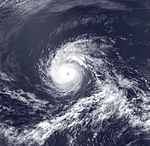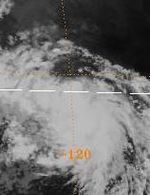1991 Pacific hurricane season
| 1991 Pacific hurricane season | |
|---|---|

Season summary map
|
|
| Seasonal boundaries | |
| First system formed | May 16, 1991 |
| Last system dissipated | November 12, 1991 |
| Strongest storm | |
| Name | Kevin |
| • Maximum winds | 145 mph (230 km/h) (1-minute sustained) |
| • Lowest pressure | 935 mbar (hPa; 27.61 inHg) |
| Seasonal statistics | |
| Total depressions | 16 |
| Total storms | 14 |
| Hurricanes | 10 |
| Major hurricanes (Cat. 3+) |
5 |
| Total fatalities | 1–3 |
| Total damage | Unknown |
| Related articles | |
| Tropical storm (SSHWS) | |
| Duration | May 16 – May 20 |
|---|---|
| Peak intensity | 65 mph (100 km/h) (1-min) 994 mbar (hPa) |
| Tropical storm (SSHWS) | |
| Duration | June 14 – June 22 |
|---|---|
| Peak intensity | 65 mph (100 km/h) (1-min) 994 mbar (hPa) |
| Category 3 hurricane (SSHWS) | |
| Duration | June 16 – June 27 |
|---|---|
| Peak intensity | 120 mph (195 km/h) (1-min) 955 mbar (hPa) |
| Category 1 hurricane (SSHWS) | |
| Duration | June 22 – June 28 |
|---|---|
| Peak intensity | 85 mph (140 km/h) (1-min) 979 mbar (hPa) |
| Tropical depression (SSHWS) | |
| Duration | June 28 – June 30 |
|---|---|
| Peak intensity | 35 mph (55 km/h) (1-min) 1006 mbar (hPa) |
| Category 1 hurricane (SSHWS) | |
| Duration | July 15 – July 31 (exited basin) |
|---|---|
| Peak intensity | 75 mph (120 km/h) (1-min) 987 mbar (hPa) |
| Category 3 hurricane (SSHWS) | |
| Duration | July 29 – August 8 |
|---|---|
| Peak intensity | 120 mph (195 km/h) (1-min) 959 mbar (hPa) |
| Category 1 hurricane (SSHWS) | |
| Duration | August 4 – August 10 |
|---|---|
| Peak intensity | 80 mph (130 km/h) (1-min) 983 mbar (hPa) |
| Tropical storm (SSHWS) | |
| Duration | August 8 – August 14 |
|---|---|
| Peak intensity | 65 mph (100 km/h) (1-min) 992 mbar (hPa) |
The 1991 Pacific hurricane season was a near-average Pacific hurricane season. The worst storm this year was Tropical Depression Five-E, which killed one person in Mexico. Elsewhere, Tropical Storm Ignacio injured forty people in Mexico, and Hurricane Fefa caused flooding in Hawaii. Hurricane Kevin was the strongest system of the season and became the then longest-lasting hurricane in the eastern north Pacific basin. Hurricane Nora was the strongest November storm at that time.
The season officially started on May 15, 1991, in the eastern Pacific, and on June 1, 1991, in the central Pacific. It lasted until November 30, 1991, in both basins. These dates conventionally delimit the period of each year when most tropical cyclones form in the northeastern Pacific Ocean.
During the season, a total of sixteen tropical cyclones developed, featuring ten hurricanes, four tropical storms and two tropical depressions. These totals are close to the climatological averages established since 1966, when satellite surveillance began. However, the season was less active than 1990, which had a record 16hurricanes (more than 1991). On the other hand, it ended late with the first November hurricane since 1966. On the other hand, the months of July and August, often the most active ones in this basin, only produced two tropical cyclones each. The activity in July is four systems below the average of six at that time due to unusual circulation patterns aloft over the tropical Pacific. A shorter gap from late August to early September was attributed to anomalous flow patterns near the Baja California Peninsula.
None of the tropical storms or hurricanes made landfall. One of the two tropical depressions of the season, Five-E, came ashore near Salina Cruz, Mexico, on the last day of June. The depression caused the only fatality of the season, injured five hundred, with two people missing. Delores, Ignacio and Marty threatened the coast of Mexico, coming close enough to require tropical cyclone watches and warnings. Of these, Ignacio was also responsible for 40 injuries as the system passed just offshore of Lázaro Cárdenas. Public advisories were issued for four other systems due to the threat of heavy rain along the coast.
...
Wikipedia














